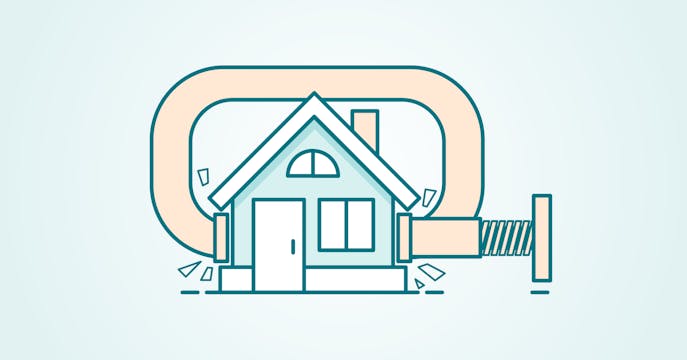Update Jan. 24, 2023: Stress Test Could Actually Get Harder
OSFI has proposed changes that would tighten lending rules and possibly make further restrictive changes to the mortgage stress test. Read more here.
Lowest Mortgage Rate in Canada. Starting from 2.49%
Say goodbye to your stress test rate of 5.25% in 2022
Both variable and fixed rates are higher, which bumps up your qualifying rate, too.
Even if you can afford the now-higher rates, you'll qualify for less home. What does it mean for your mortgage — and how can we help?
Updated Jan. 24, 2023
Remember when the 5.25% stress-test rate seemed kinda high?
That's when mortgage rates were a lot lower (for a long time).
It seemed a sizeable jump in June of 2021, when OSFI (Office of the Superintendent of Financial Institutions) upped their required mortgage stress test rate to 5.25%. This federal body was worried about the continuing lower rates and wanted to increase the margin of safety for Canadians, so they could still afford their mortgage payments if rates ever went up.
Well, rates are up.
And now, almost all variable and fixed mortgage rates have increased beyond that stress-test 5.25% rate ceiling set by the government.
A lender will use whichever is higher — either a rate of 5.25% OR your actual rate plus 2.0% to qualify your mortgage loan amount. So for today's higher rates on 1 to 5-year mortgage terms, the 5.25% ceiling is obsolete.
What's the stress-test impact on your mortgage affordability right now?
Rates are up, and house prices are still considered high across Canada, despite the drag on home sales due to recent rate hikes. But even if you can afford the higher rates right now and the higher stress-test rate, you'll qualify for less with a lender for your mortgage amount.
How does that work? Let's take True North Mortgage's current 5-year fixed rate of 4.54%, which would now have to qualify at a 6.54% stress-test rate, and compare that to the previous 5.25% qualifying rate.
We'll assume some basic details, like a $100K annual income, $3,800 property tax of home purchased, $100 monthly heating costs, 25-year amortization, and 5% down payment:
| 5.25% old stress-test rate | 6.54% new Stress-Test Rate | |
|---|---|---|
| Home price you'll be approved for | $475,000 | $430,000 |
| Reduction of home buying power | About 10% less (the higher the rate, the less you qualify for) |
Should you get a lower variable-rate mortgage instead?
With the above example, the irony is that if you decide to go with a variable rate right now, you'll get back an extra boost in home-buying power.
Most variable rates are lower than current fixed rates despite the recent increases to the prime rate — enough to lower your qualifying rate compared to a fixed rate. But, more increases are coming, as indicated by the Bank of Canada; how many and how quickly is more of a spoiler alert than a promise, because we all know that future rate hikes like to evade accurate prediction.
First-timers often feel more comfortable with a fixed rate and the budget certainty it provides over their term. But if qualifying for more home right now is important to you, our current True North Mortgage variable rates may provide some stress-test relief for lower mortgage payments (which will increase along with prime) and a higher pre-approval amount.*
Will we ever say goodbye to the stress test itself?
The mandatory stress test was introduced during a time of sustained lower interest rates to help protect Canadians and lenders from potential financial catastrophe if (when) they one day rise again.
Even if (a BIG if) the stress test eventually ends or is reduced, in the here and now, home buyers (or those wanting a mortgage change) have to adjust their expectations inline with the current rules.
Say hello to great mortgage advice to save money and stress.
There are a lot of changes underfoot in the mortgage industry, such as the potential for higher rates, changing government policies, and lenders reviewing their mortgage bottom lines based on market volatility (like supply and demand issues). But you don't need to panic!
We're here to provide your best rate and exceptional service — to save you a pile of cash. We've already helped thousands of Canadians get into their first home, next home, or vacation or rental property. Not to mention all their other mortgage needs along the way, like renewals and refinances.
And, we're not going anywhere. With over 19 years under our belt, we're here for you in Canada — online, over the phone, through our chatbot Morgan, or at a store near you.
*Mortgage qualification and pre-approval are based on individual financial factors and lender requirements.
Your best rate can make a difference. Give us a shout.
More mortgage info to help out

Compare & Save Calculator
See for yourself how much you can save with our lower rates.

Proof that our rates are lower.
Our rates are 0.18% lower on average compared to everyone else. Prove it? Okay!

Mortgage Stress Test: What is it and how does it work?
You have to be able to handle higher payments as a buffer for affordability.

